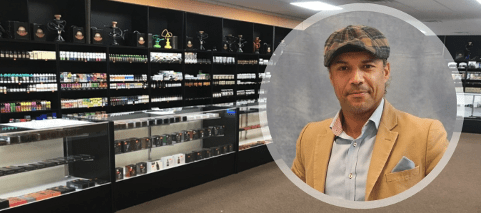Getting to the root of the problem: does tobacco product exposure where Black and Latiné youth live, work, and play increase their risk of tobacco-related health disparities?
UCI researcher receives $1.3 million dollar grant from the Tobacco-Related Disease Research Program

The Tobacco-Related Disease Research Program has awarded co-principal investigator, Jason Douglas, PhD, vice chair and associate professor of health, society, and behavior, from the UC Irvine Program in Public Health, a $1.3 million, 2-year, first-of-its-kind study to examine the relationship between Black and Latiné (gender neutral versions of Latino/a) youth tobacco product exposure and use within their everyday activity spaces.
Tobacco products (e.g., cigarettes, e-cigarettes) used among Black and Latiné youth pose an immense public health challenge. Extensive evidence has proven that tobacco product-use among youth increases the risk of addiction, reduces lung function, and causes early cardiovascular damage – in the short term – and lung cancer in the long term. Thus, it is concerning that underserved Black and Latiné communities, such as South Los Angeles, CA, have a high density of smoke shops that specialize in tobacco products (e.g., cigarettes, e-cigarettes, little cigars). Yet, little is known about the adverse public health effects that smoke shops have on tobacco product use, especially since they are disproportionately located in Black and Latiné communities
“At the heart of this project lies an understanding that the complexities of tobacco-use in diverse communities cannot be fully grasped within the confines of academia alone,” said Douglas. “The success of this project requires a collaborative effort and a partnership with affected South Los Angeles youth and adult residents built on trust, respect, and shared purpose.”
Dr. Douglas has partnered with Kevin Orange, a co-principal investigator and the executive director of Advocates for Peace and Urban Unity (APUU). Orange is also a community gang specialist and peace advocate worker who focuses on South Los Angeles communities, including Westmont/West Athens, California – the central location of their study.
Using a community-academic partnership, Douglas and APUU will engage with adolescents and young adults and key stakeholders in Westmont/West Athens neighborhoods to examine how smoke shops located near youth activity spaces influence Black and Latiné youth exposure to and use of tobacco products. To understand the exposure and risk, the team will use an innovative participatory mapping approach to identify and categorize popular activity spaces where adolescents and young adults are exposed to and use tobacco products and their proximity to smoke shops. Next, using photovoice, the team will explore their study participants’ lived experience of tobacco product exposure and use. Finally, using a Participatory Geographic Information Systems, the team will develop a tobacco product exposure and use risk index that can be used for geographically targeted youth tobacco prevention outreach.
“One of the exciting aspects of this study is the potential for transformative impact,” Douglas said. “Equipping our community leaders with a risk index that melds data with lived experience gives them the power to advocate for better policies and interventions that protect their constituents and community members.”
TRDRP is funded through the state’s tobacco tax and individual contributions. Funds are administered by the Research Grants Program Office at the University of California, Office of the President.